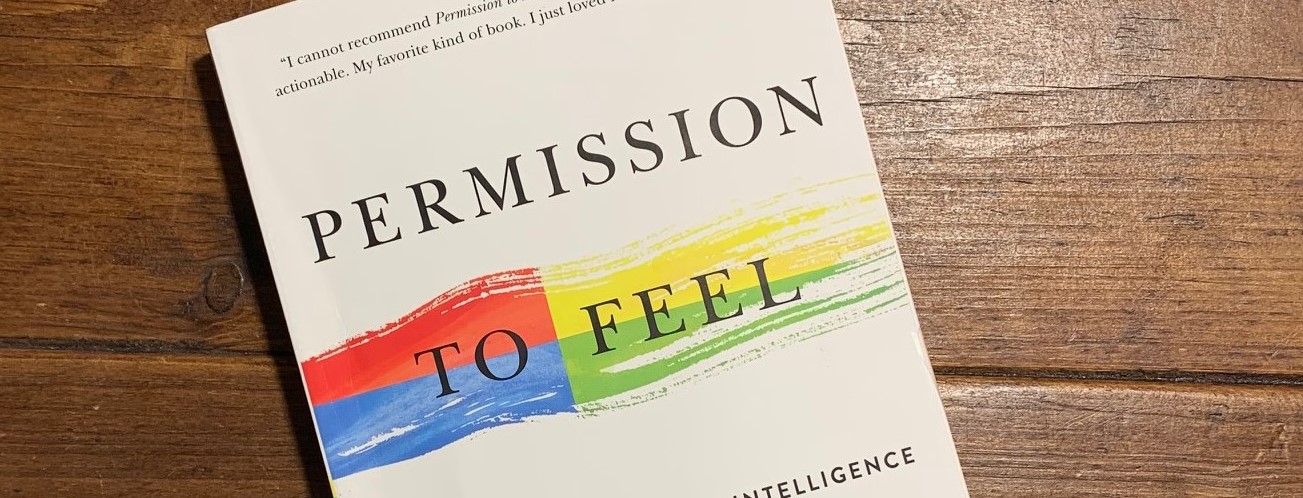
Book Recommendation: "Permission to Feel"
Posted on August 5, 2020 by Blake Leath
Permission to Feel: The Power of Emotional Intelligence to Achieve Well-Being and Success
I don’t know how you’re feeling right now, but I know that you are. That’s the gist of Permission to Feel, in which Marc Brackett estimates perhaps only 2/5ths of us have a working language capable of adequately describing our feelings.
“I’m fine,” “All good,” “A-Okay,” “Another day in paradise” and “If I were any better I’d be twins” are cop-outs and we know it, but they’re chirpy and cheery, don’t necessitate effortful dialogue, require no thinking on our part and, perhaps best of all, they’re quick. Heaven forbid someone should actually endeavor to tell us how s/he REALLY feels. Eesh, that would require empathy, listening, and time…something many of us possess in only very limited quantities.
As family and friends die, our economy sputters, branded empires collapse, immigrants fear their future, frontline healthcare workers + police + firefighters wear down, teachers gird their loins for the viral new year, and parents whisper prayers over their kids before breathing deeply and pushing them out the door to school, the emotions we collectively feel right now are legit, powerful, and outright overwhelming. That much I can adequately describe.
Pessimism, apathy, anger, anxiety, sadness, stress, impatience, irritability, guilt, fatigue, boredom, pressure, worry, regret, distraction, embarrassment, shame, resentment, fear… They can simply be too much sometimes, and certainly 4-6 months (or years) into this New Abnormal.
Into this reality, however, Permission to Feel offers a lot of great, simple, actionable tips, tricks and skills. It’s not a daunting, discouraging book. On the contrary, it’s jam-packed with fun research and tools, and I bet you can buzz through it in two or three sittings.
Here are a few teasers for teachers, in particular, as school is upon us once again:
- “High school students and teachers experience negative emotions up to 70% of the time they are in school.”
- “Research shows that having just one caring, capable adult can make the difference between whether a child thrives or not.”
- “Classroom research shows that where there is an emotionally skilled teacher present, students disrupt less, focus more, and perform better academically.”
- “Emotions determine whether academic content will be processed deeply and remembered.”
Marc (Director of Yale’s Center for Emotional Intelligence and a professor in the Child Study Center in Yale’s School of Medicine) offers this brief exercise that’s helpful for each of us, no matter our role or profession:
“In seminars I conduct with teachers, I’ll sometimes ask them to list their students and consider the feeling that each name automatically prompts. Is it love, dislike, trust, joy, fear, disgust? Next I’ll say, Be honest and think about how that emotion causes you to act toward each of those children. They instantly recognize how differently they treat each child depending solely on their perception of how he or she makes them feel. It has little to do with how the child performs in class, or the child’s needs, or anything they can name. It’s just a strong, almost visceral reaction that usually has to do with something about the teacher, not the student. Outside the classroom, we all operate the same way: approach or avoid.”
And so, as we struggle with death and destruction, face masks, physical distancing (which eerily equates to social isolation), the politics of fear, and perpetual ambiguity, let us focus on our locus of control: You may not change me. I may not change you. But if I so choose, I can embrace a vocabulary and skill set that empowers me to more successfully say how I feel, and that’s the sort of thing that changes (and SAVES) lives.
Permission to Feel. In paperback yesterday.
#PermissionToFeel
#ReadOn